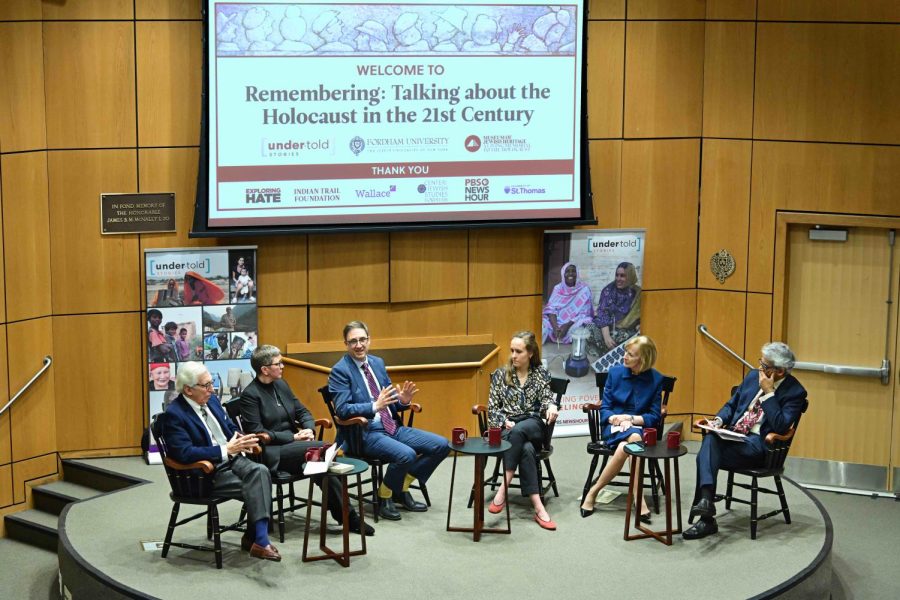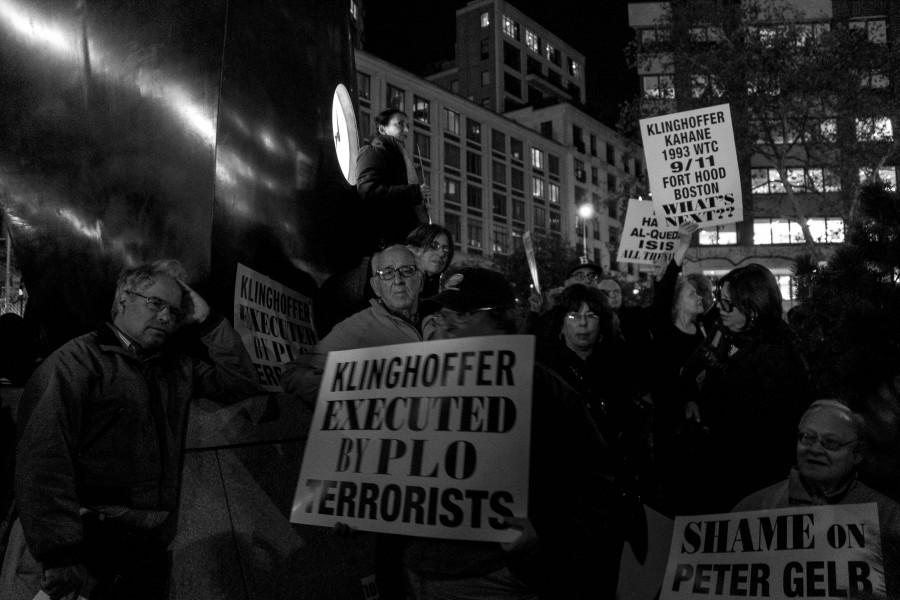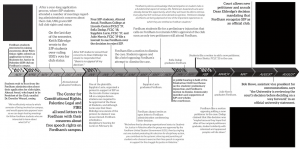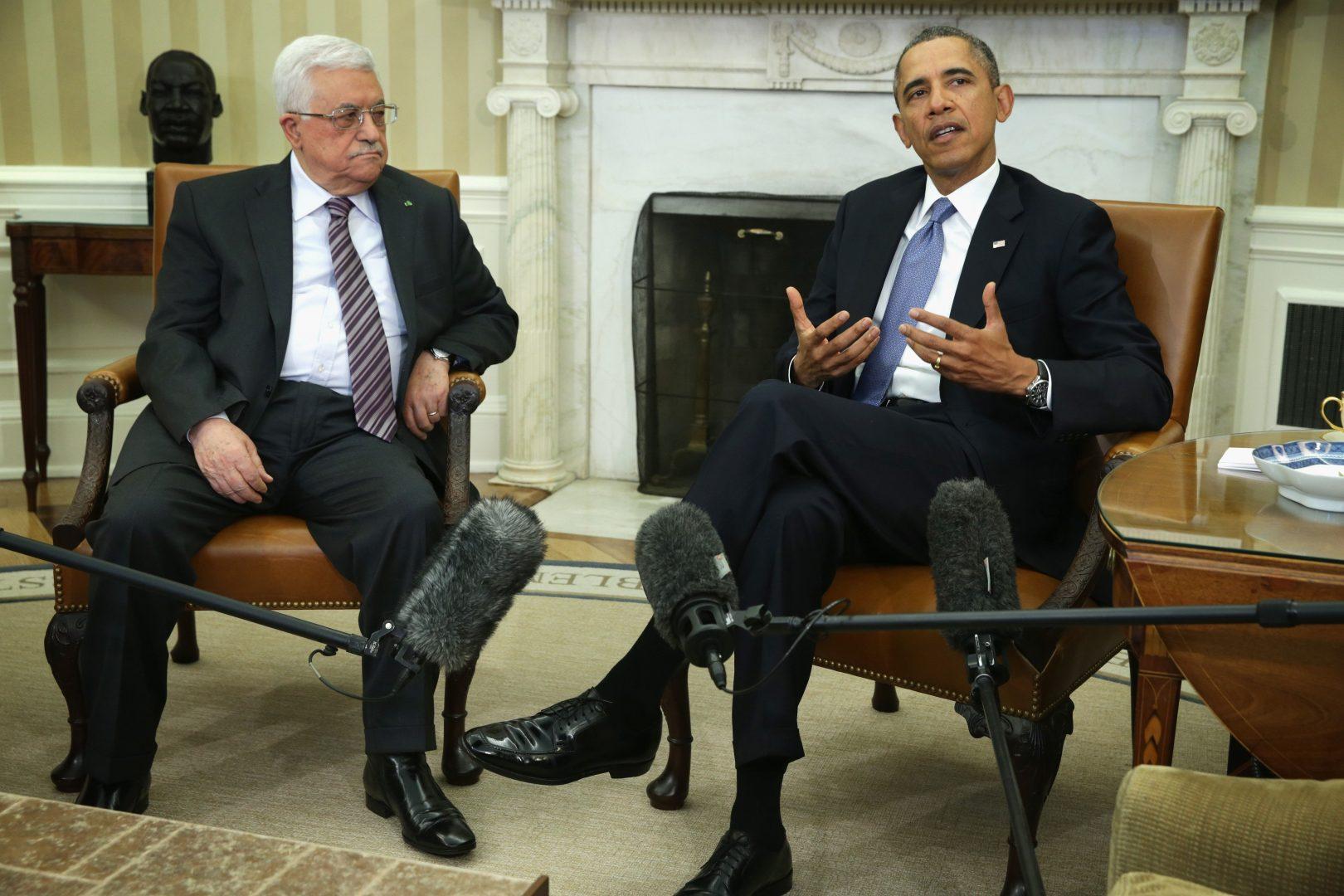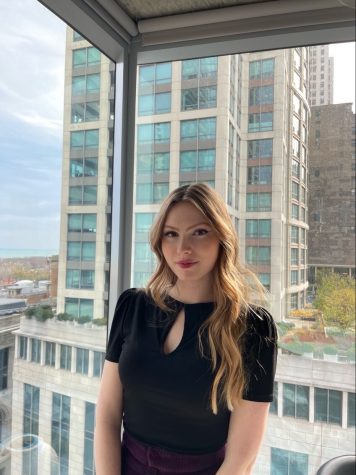Fordham Hosts Panel in Honor of Holocaust Remembrance Day
The event discussed the rise of antisemitism and featured Holocaust survivor Eva Paddock and guests from other universities
COURTESY OF CHRIS TAGGART VIA FORDHAM NEWS
The panel discussed the importance of Holocaust recognition and education in schools.
February 8, 2023
Fordham University, in collaboration with the Museum of Jewish Heritage in New York and the Under-Told Stories Project of the University of St. Thomas in Minnesota, hosted a panel on Jan. 26 titled “Remembering: Talking About the Holocaust.” The discussion, which took place in the McNally Amphitheater, aimed to raise awareness of the increasing importance of Holocaust recognition and address how to fight Holocaust denialism.
The panel featured Judy Woodruff, senior correspondent for PBS NewsHour; Magda Teter, Shvidler chair of Judaic studies at Fordham University; James Loeffler, historian and Jewish studies program director at the University of Virginia; and Linda Kinstler, author of “Come to This Court and Cry: How the Holocaust Ends.”
Fred de Sam Lazaro, director of the Under-Told Stories Project and a professor at the University of St. Thomas, and Peter Osnos, American journalist and founder of PublicAffairs Books, moderated the discussion.
Eva Paddock, a leader in education and one of Winton’s “children,” was invited as a special guest and spoke about her experiences following her escape from the Nazis.
Prior to the start of the panel, the event screened de Sam Lazaro’s PBS NewsHour segment on the book “Nicky & Vera: A Quiet Hero of the Holocaust and the Children He Rescued,” written by Peter Sís. The children’s book sheds light on the story of Nicolas Winton, a silent hero who helped 669 children escape Czechoslovakia by train before the country’s Nazi occupation.
Eva Paddock, a leader in education and one of Winton’s “children,” was invited as a special guest and spoke about her experiences following her escape from the Nazis. Paddock described a series of events, from bonding with her loving foster family in England to her father’s escape and the unlikely help of strangers throughout Europe.
In addition to sharing her experiences during the Holocaust, she also noted her own thoughts about modern education on the Holocaust. She explained the importance of making the Holocaust relevant to today when teaching people about it in order to “honor those lost and reframed to demonstrate the power of altruism.”
She also noted how her own narrative as a survivor through Winton’s selflessness can serve as an example of the power of one person and their kindness.
Loeffler noted that due to these various experiences, a modern understanding of the Holocaust requires a “frame for an ethical response and understanding” of its events.
The talk began with Loeffler examining how there are different narratives, memories and legacies that were developed as a result of the Holocaust. Loeffler noted that due to these various experiences, a modern understanding of the Holocaust requires a “frame for an ethical response and understanding” of its events.
Regarding contemporary discourse on the Holocaust, Teter stressed how contextualizing the Holocaust by analyzing its “mental framework” and “processes” can “recalibrate its story to include the longer story of how the Holocaust ends and begins.”
Kinstler reflected on her own writings and referenced how current conversations need to find language to describe the Holocaust’s history during the transition from its presence as a moment to its solidification as a historical event.
Reyna Stovall, Fordham College at Lincoln Center (FCLC) ’25 and an attendee at the event, voiced her thoughts regarding education on Jewish studies and creating an accepting culture at Fordham after the program.
“Speaking out against antisemitism is important, but backing that with action is even more valuable at combating the underlying causes of antisemitism,” she said.
Stovall suggested mandating that the Holocaust be integrated into K-12 schools and their curricula to ensure that younger children are not only aware of the Holocaust but also the events that preceded it.
“By teaching kids from a young age not only what the Holocaust was but also its warning signs and how they can not be bystanders, I think they become better global citizens and more aware of the atrocities occurring around the world in the past and present,” she said.
“I think Fordham should host more Jewish voices in the same way they hosted the Holocaust remembrance panel.” Claire Seka, FCLC ’25
Claire Seka, FCLC ’25 and another attendee at the event, was inspired to reconsider how Fordham could reinvent the student experience.
“I think Fordham should host more Jewish voices in the same way they hosted the Holocaust remembrance panel,” she said. “I think it’s very important to teach the Holocaust, and I know it’s debated whether to show the graphic images of the camps. However, it’s undeniable that we must still teach about the event, and specifically the events which led to the internment camps, in an open and detailed manner.”
The panel was livestreamed and is available online for those who could not attend the event.

